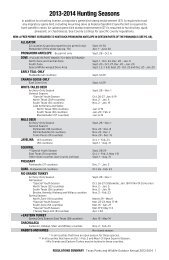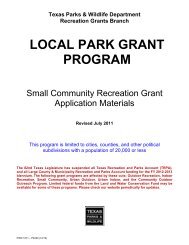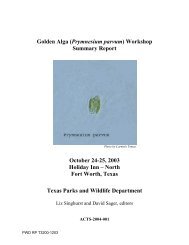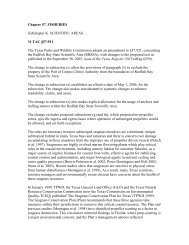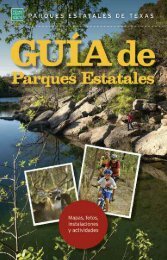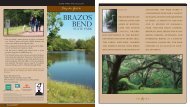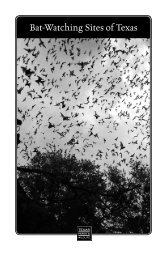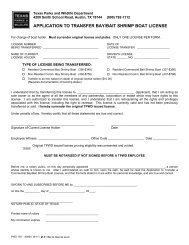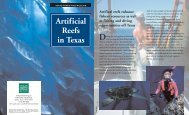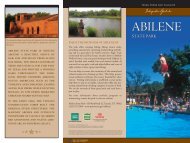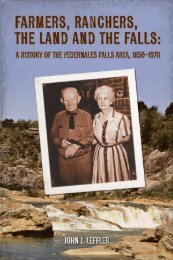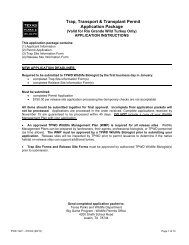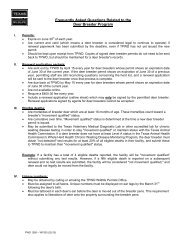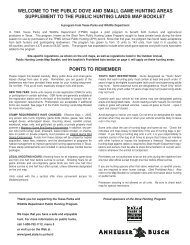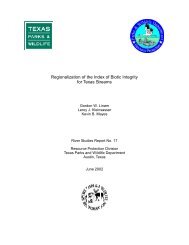2007 TPWD Annual Report - Texas Parks & Wildlife Department
2007 TPWD Annual Report - Texas Parks & Wildlife Department
2007 TPWD Annual Report - Texas Parks & Wildlife Department
Create successful ePaper yourself
Turn your PDF publications into a flip-book with our unique Google optimized e-Paper software.
In late <strong>2007</strong> <strong>TPWD</strong> added the USTS <strong>Texas</strong> Clipper to its ShipstoReefs program by reefing the<br />
venerable ship 17 miles off the <strong>Texas</strong> coast in the Gulf of Mexico, near Brazos Santiago Pass.<br />
Preparations for the sinking, including the removal of hazardous and nonhazardous materials, had<br />
been underway since 1998. In addition to providing new habitat for fish, the reef will expand<br />
recreational opportunities for divers, and fishing opportunities for anglers, which should generate<br />
an estimated additional $50 million in tourism revenue for local economies.<br />
Land and Water Initiatives<br />
Because more than 90 percent of <strong>Texas</strong> is privately owned, building partnerships with landowners is an important part of<br />
<strong>TPWD</strong>’s work to ensure sustainable wildlife habitat. The <strong>Wildlife</strong> Division continued to provide technical assistance to<br />
landowners requesting support for their work as committed land stewards. The most significant challenges to freshwater<br />
and saltwater systems in <strong>Texas</strong> are reduced water quality and decreased water quantity. In response to these challenges,<br />
water initiatives were at the forefront of the agency’s work in <strong>2007</strong>.<br />
Land Conservation Milestones<br />
The <strong>Wildlife</strong> Division staff increased their work assisting landowners in managing their lands for<br />
sustainable wildlife habitat to meet their goals, through initiatives such as the Landowner<br />
Incentive Program and the annual Lone Star Land Steward Awards. The division also continued<br />
to implement the <strong>Wildlife</strong> Action Plan and its land conservation initiatives.<br />
The division continued its work with the <strong>Texas</strong> Panhandle Prescribed<br />
Burn Association to put into place a cooperative model that allows<br />
landowners to improve their habitat through prescribed burning and to<br />
share in the cost of equipment and resources. The division is working<br />
to share the successes of the association, which was started in 2005,<br />
and to use it as a model for prescribed burn associations in other areas<br />
of the state.<br />
In November 2006, <strong>TPWD</strong> and the U.S. Fish and <strong>Wildlife</strong> Service<br />
entered into an agreement that is intended to help landowners conserve<br />
the lesser prairie chicken. Under the agreement, landowners who take<br />
voluntary conservation measures, such as brush control, prescribed<br />
burning, grazing management, and periodic monitoring would be exempt<br />
from additional land use restrictions and conditions should the species<br />
ever be declared threatened or endangered.<br />
Over the next three years, researchers from Stephen F. Austin State<br />
University will track and study Eastern wild turkeys in Nacogdoches,<br />
Anderson and Houston counties to try to determine the effects on the<br />
birds of various management strategies. The study follows up on a<br />
restoration partnership that began 10 years ago when <strong>TPWD</strong>, private<br />
landowners and the National Wild Turkey Federation began an initiative<br />
to restore Eastern wild turkeys to suitable habitat. While some turkeys<br />
have done well, others have been less successful. The study will help<br />
researchers and biologists better determine what constitutes sustainable<br />
habitat. In addition, studies of Rio Grande wild turkeys are being<br />
conducted in other parts of the state.<br />
<strong>TPWD</strong> 15 FY07



